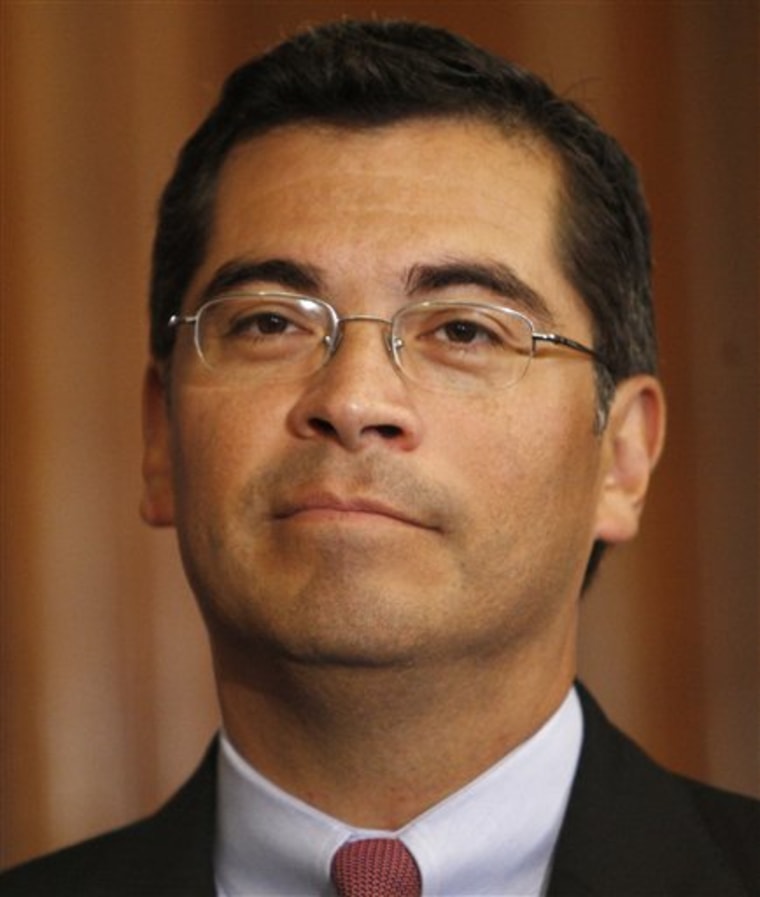The California congressman in discussions with President-elect Barack Obama to become U.S. trade representative played a role in President Bill Clinton's commuting the prison sentence of a cocaine dealer. The cocaine dealer's family had made $15,000 in political donations to the congressman and hired Clinton's brother-in-law for $200,000 to help free Carlos Vignali.
The case involving Rep. Xavier Becerra, D-Calif., marks the second time the 7-year-old controversy over Clinton's final actions has surfaced as Obama organizes his new administration. Republicans earlier resurrected the role of Eric Holder, Obama's pick for attorney general, in the pardon of fugitive financier Marc Rich, who won a pardon on Clinton's last day in office.
As U.S. trade representative, Becerra would negotiate international trade deals and oversee trade policy. The job would be important in Obama's administration, which has called for renegotiating the 1994 North American Free Trade Agreement with Canada and Mexico.
Becerra was a candidate for mayor of Los Angeles in early 2001 when it came to light that he and several other politicians and prominent public figures wrote letters supportive of Vignali, who was accused of shipping 800 pounds of cocaine — worth about $5 million then — from Los Angeles to Minneapolis.
The federal judge who sentenced Vignali later complained that the commutation was inappropriate.
"Vignali was not a low-level operator in the conspiracy," said U.S. District Judge David S. Doty. "He played a major role in the financing, transport and procurement of the drugs."
Vignali's father spent six years and $160,000 in political donations, and paid $200,000 to Hugh Rodham to free his son. Hugh Rodham is the brother of then-first lady Hillary Rodham Clinton, whom Obama has selected to become secretary of state. Carlos Vignali was less than halfway through a 14 1/2-year prison term when President Clinton let him out.
Bill Clinton's decision to free Carlos Vignali "was every bit as egregious and misdirected as the pardon of Marc Rich," said Mark Corallo, a Republican who worked on the House Government Reform Committee, which investigated Bill Clinton's pardons. "Congressman Becerra will probably have to answer for supporting the (commutation) for this cocaine dealer."
At the request of Horacio Vignali, a Los Angeles businessman, Becerra wrote to Bill Clinton on Nov. 21, 2000, asking him to evaluate the case. Carlos Vignali was 22 when convicted of conspiring to sell 800 pounds of cocaine.
Horacio Vignali contributed more than $15,000 to Becerra's campaigns and his political action committee and hosted a fundraiser for his mayoral campaign seven months before Carlos Vignali was freed from prison, according to campaign finance records.
Doty, the judge, said Carlos Vignali exhibited no signs of remorse and took no responsibility for his role in the crime, according to an article the judge wrote for the Federal Sentencing Reporter, a legal publication.
Writing about himself in the third person, the judge asked, "Should it matter that, in the Vignali case, the prosecutor was outraged and the judge was astonished and thought that justice was not done?"
On Wednesday, a law clerk in Doty's office said he stands by his comments.
Becerra has maintained that he did nothing wrong. In an interview with the Los Angeles Times in early 2001, the congressman said he never pushed for a presidential commutation, but rather was seeking a review of the facts of Carlos Vignali's conviction.
He saw no attempt at pressure in making a call to the White House the day before the commutation to ask about the case.
"If I was going to try to put pressure on, I would have tried to call the president," Becerra told the Times.
Becerra was elected to the House in 1992 from Los Angeles and sits on the Ways and Means panel that oversees trade issues. He voted for NAFTA but later said he regretted the vote. He opposed giving the White House fast-track negotiating authority in 2002 and led opposition to the 2005 Central American Free Trade Agreement, citing what he called subpar labor standards.
A member of the House Democratic leadership as vice chairman of the Democratic Caucus, Becerra supported the Peru trade deal last year.
